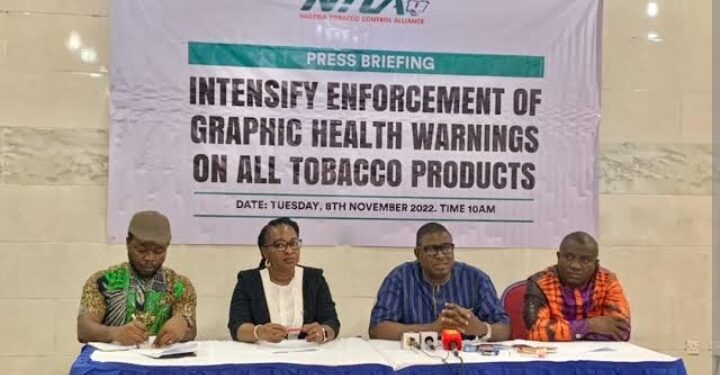The Nigeria Tobacco Control Alliance (NTCA) has expressed concern that government agencies still hold meetings with tobacco industries, despite the health challenges tobacco usage poses on Nigerians particularly the youths.
The Alliance who noted this while briefing newsmen in Abuja on “Stop Tobacco Industry Interference: Enforcement Graphic Health warnings now”, reminded the concerned agencies that the offices they hold is based on public trust and must be used in the health interest of all Nigerians.
The Chairman of NTCA, Mr Akinbode Oluwafemi, represented by the Programme Manager, NTCA, Mr Chibuike Nwokorie, stressed that the World Health Organization (WHO) estimates that the economic costs of tobacco-related illnesses amount to billions of dollars.
He also called on Standards Organizations of Nigeria, Federal Ministry of Health, the Nigeria Police Force, Federal Competition and Consumer Protection Commission, Nigeria Customs Service, Nigeria Security and Civil Defence Corp, and all agencies tasked with enforcement of tobacco control laws to save Nigerians by beginning the enforcement of the graphic health warnings policy without delay on all tobacco products.
He said that recognizing this, Nigeria ratified the WHO Framework Convention on Tobacco Control (FCTC) in 2005, and enacted the National Tobacco Control Act in 2015, signaling its commitment to implementing evidence-based strategies to end tobacco consumption.
He said one of these strategies is the graphic health warnings policy contained in the National Tobacco Control Act of 2015 and the National Tobacco Control Regulations approved in 2019.
“According to a recent study by the Institute of Clinical Effectiveness and Health Policy in collaboration with an indigenous research group, the Centre for the Study of the Economies of Africa; a full implementation of the graphic health warnings policy will end 11,744 deaths caused by tobacco use; prevent 32,608 illnesses attributed to tobacco use and save the country N6.7m in healthcare costs annually.
“These projections reiterate the fact that graphic health warnings on tobacco packs are effective in reducing tobacco use and uptake, and that they indeed save lives.
“The first set of the two-year rotational warnings; a photo showing the diseased lungs of a smoker, and the healthy lungs of a non-smoker, expired on June 23rd, 2023. The current set of graphic health warnings; an image showing mouth cancer caused by tobacco use was approved by the Federal Ministry of Health and came into effect in June 2023,” he said.
He added, “Curiously, the National Tobacco Control Act gives a moratorium of 150 days before enforcement, during which tobacco companies are expected to phase out products bearing the outdated warnings.
“Another significant obstacle to tobacco control in Nigeria is the tobacco industry’s interference in policy-making processes. The industry employs various tactics, such as lobbying and strategic marketing, to influence decision-makers and dilute the impact of tobacco control measures.
“This interference not only undermines the effectiveness of existing policies but also hampers efforts to introduce more stringent regulations. To strengthen tobacco control in Nigeria, there is a crucial need to address these influences through transparent and accountable governance.”











